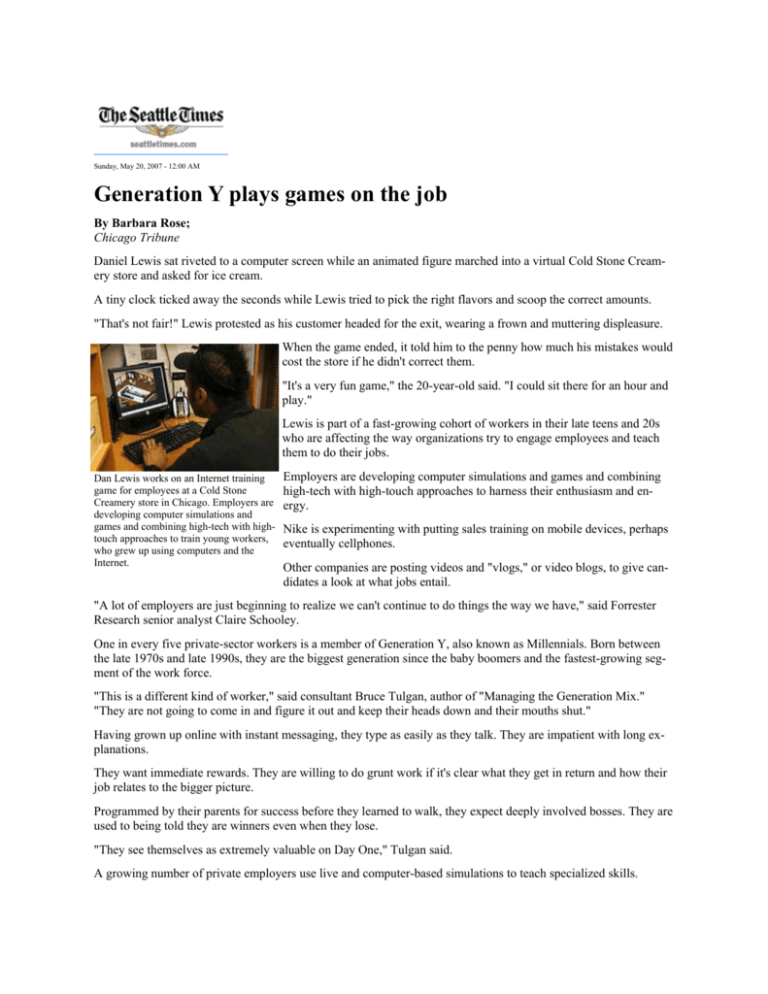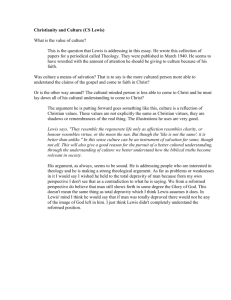Generation Y Plays Games on the Job
advertisement

Sunday, May 20, 2007 - 12:00 AM Generation Y plays games on the job By Barbara Rose; Chicago Tribune Daniel Lewis sat riveted to a computer screen while an animated figure marched into a virtual Cold Stone Creamery store and asked for ice cream. A tiny clock ticked away the seconds while Lewis tried to pick the right flavors and scoop the correct amounts. "That's not fair!" Lewis protested as his customer headed for the exit, wearing a frown and muttering displeasure. When the game ended, it told him to the penny how much his mistakes would cost the store if he didn't correct them. "It's a very fun game," the 20-year-old said. "I could sit there for an hour and play." Lewis is part of a fast-growing cohort of workers in their late teens and 20s who are affecting the way organizations try to engage employees and teach them to do their jobs. Dan Lewis works on an Internet training game for employees at a Cold Stone Creamery store in Chicago. Employers are developing computer simulations and games and combining high-tech with hightouch approaches to train young workers, who grew up using computers and the Internet. Employers are developing computer simulations and games and combining high-tech with high-touch approaches to harness their enthusiasm and energy. Nike is experimenting with putting sales training on mobile devices, perhaps eventually cellphones. Other companies are posting videos and "vlogs," or video blogs, to give candidates a look at what jobs entail. "A lot of employers are just beginning to realize we can't continue to do things the way we have," said Forrester Research senior analyst Claire Schooley. One in every five private-sector workers is a member of Generation Y, also known as Millennials. Born between the late 1970s and late 1990s, they are the biggest generation since the baby boomers and the fastest-growing segment of the work force. "This is a different kind of worker," said consultant Bruce Tulgan, author of "Managing the Generation Mix." "They are not going to come in and figure it out and keep their heads down and their mouths shut." Having grown up online with instant messaging, they type as easily as they talk. They are impatient with long explanations. They want immediate rewards. They are willing to do grunt work if it's clear what they get in return and how their job relates to the bigger picture. Programmed by their parents for success before they learned to walk, they expect deeply involved bosses. They are used to being told they are winners even when they lose. "They see themselves as extremely valuable on Day One," Tulgan said. A growing number of private employers use live and computer-based simulations to teach specialized skills. "Employers are moving headlong into computer simulations and animated training modules," said Schooley, the analyst. Nike began developing Web-based training four years ago to reach sales associates who work at sporting-goods stores that carry Nike products. Their average age is 18 to 24. "We thought about this audience for quite a while," said Michael Donahue, a program manager at Nike's Beaverton, Ore., headquarters. "We knew the program had to be entertaining. A lot of these kids have grown up in the gaming era." The result was "Sports Knowledge Underground," an interactive program with animation and sound that mimics a subway system with routes to learning basic sales skills and product information. The program is updated quarterly when new products launch. Donahue credits the training with increasing sales 5 to 6 percent at stores that use the program. Next on the horizon is a version that can be delivered to personal digital assistants and iPods, and perhaps eventually to cellphones. Cisco Systems, maker of computer-networking gear, developed a computer game to teach binary math, a skill fundamental to networking. "We really believe the game is effective," said Jerry Bush, a Cisco program manager who developed it. "Typically somebody who plays for five minutes will solve maybe 50 problems. These people are highly engaged and having a good time." Other companies are using online videos as recruiting tools. Global accounting firm Ernst & Young, which expects to hire 3,300 college graduates this year, gave a group of San Francisco interns video cameras and encouraged them to "vlog" about their experience. The three-minute video posted on the career section of the firm's Web site promises an "intern's eye view" of the San Francisco office. At Cold Stone Creamery, where most store employees are high-school or college students, an online video introduces them to the company. "Our job is as much to impress this new crew person as it is for this person to impress us, because it sets the stage for retention," said Renee McWenie, senior director of training at the company's Scottsdale, Ariz., headquarters. New employees go through several hours of computer-based training with quizzes in addition to person-to-person instruction. Each of the lessons is less than eight minutes, McWenie said. "They need information in really short bursts." Kelly Coomer, who owns two Cold Stone franchises in Chicago, said the training "helps weed out people who don't fit. [The job] is a lot of hard work." ABEL URIBE / MCCLATCHY NEWSPAPERS Dan Lewis, a student at The Illinois Institute of Art in Chicago, is a shift leader for Cold Stone Creamery. The computer game Lewis played in one of Coomer's stores reinforces memorization of Cold Stone's 35 flavors and "helps ensure they understand some of the components of our profitability," she said. "If they waste ice cream, that's the most expensive component that's in their control." Lewis, a student at Illinois Institute of Art, is doing well. He recently got promoted to shift leader. "I'm still learning things," he said. Copyright © 2007 The Seattle Times Company




